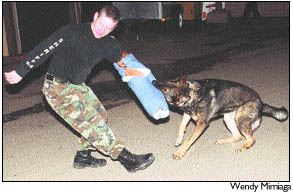|
Mar. 7, 2001
By Aspen C. Emmett A dog is a manís best friend ó unless of course the man is a suspect running from the Montezuma County Sheriffís K-9 deputies. The K-9 unitís four-legged law enforcers track suspects, search buildings, locate drugs and protect their handlers ó all for love of the job. Recently MCSO K-9 deputies Mike Marston, Eric Trapp and Keith Hoffman shared their experiences and abilities with participants of the Citizens Police Academy. MCSO Deputy Mike Marston said working alongside a dog was something he always wanted to do and for the past three years, he and his canine partner, Kilo, have been living out that dream. Marston said he wrote several grants and was turned down a number of times before Kilo, a professionally trained German shepherd from Czechoslovakia, came to work at his side. "Theyíre not cheap," he said. "Not just any old German shepherd can make a police dog." Marston said he and Kilo worked on becoming friends and went through extensive training before they actually hit the streets as a team. "Everywhere I went he went too," Marston said. "You just become really close with them." Marston said that tracking suspects is the primary type of work his dog is used for. He explained that the dogs are trained to track "ground disturbance," following the freshest human scent in an area. "Ninety percent of what the K-9ís do here is tracking, so weíre getting really good at it," Marston said. "If heís (the suspect) out there, theyíre going to find him." Marston said the dogs are also trained to apprehend a suspect who runs from police. Under extreme circumstances, if a suspect does not stop or come out of a hiding spot after several warnings, an officer can send a dog in to "bite and hold." Marston emphasized that the method is not often used and that when it is, the dog bites the first available area of the suspectís body and holds the bite ó only biting a second time if he loses hold of the first bite. "Theyíre not trained to maul people," he said. "Itís a fancy game of fetch." The dog lets go of its hold when the officer gives the proper command. Marston said utilizing a K-9 to apprehend a suspect is not considered deadly force. "It falls somewhere between pepper spray and a baton," he said. In three years of working with Kilo, Marston said there have been only four instances where he used him in the capacity of "bite and hold." Teaching other officers to work with canines often presents a challenge, Marston said, because one of the most important rules is that the dogs go first when tracking or searching for a suspect ó a rule some officers often have to be reminded of. "You donít get in front of the dog," he said. "Sometimes we feel like taking the leash off the dog and putting it on the cop," he said jokingly. Deputy Hoffman brought his canine partner, "Zeke," from Telluride where they had also worked as a K-9 team. Zeke, who specializes in searching for narcotics, is trained to search for drugs by scent, Hoffman said. The smell of the drug is associated with Zekeís play toys ó the toys actually being well-sealed bags containing narcotics. "Itís just a game for him and thatís how I get him to search," Hoffman said. Deputy Trapp said working with his dog, "Keno," has provided him extra protection whether he is on patrol or searching for a subject. "Itís built-in back-up," Trapp said. "The dogís No. 1 priority is to protect its handler." Marston said K-9 officers do everything that any other MCSO deputy is expected to do, but opportunities often arise that allow the dogs to be put to work. "We donít get anything extra for handling a dog besides the satisfaction of doing it," Marston said. MCSO Detective Lt. Kalvin Boggs said the department is lucky to have such a strong K-9 unit. "There are departments three or four times larger than ours that donít have what we do," Boggs said. "So weíre really fortunate that we can support the three that we have." Boggs added that one Cortez police detective and one local Colorado State Patrol officer also have K-9ís at work in Montezuma County. "Itís a big deal to have that many dogs," he said. |
||
|
Copyright © 2001 the Cortez Journal.
All rights reserved. |
